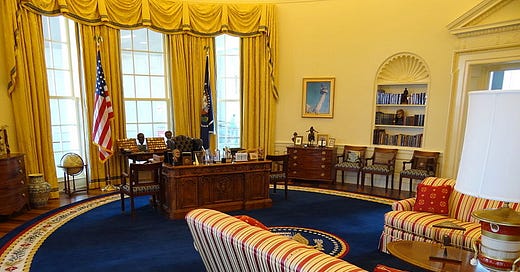The World is Hard to Change
Inside: My interview with Statecraft, a brief reflection on Daniel Kahneman's passing, my favorite article of the year, and a reader suggestion on where expertise forms in diplomacy.
I was traveling this week and didn’t have time for a full article, but I wanted to offer a few quick thoughts before the weekend:
How to Fix the State Department. Did you see my interview with
over at his publication, Statecraft? We discuss some tough questions, including: Why don’t we learn from foreign policy mistakes? and, Why do presidents lean so heavily on the National Security Council rather than the State Department? We even engage in a little healthy argument! Check it out here.
The World is Hard to Change from Matt Grossman, is one of the best things I’ve read all year. He writes, “If we find that we cannot easily solve a social problem, that a policy solution with promise does not pan out or that successes cannot easily be scaled up or replicated, that does not mean that your prior preferred social arrangement will work better or that a different revolution is more justified. It does not mean that dismissing scientific evaluation (or relaxing our standards of “evidence”) would make it easier to agree on sweeping policy changes. It just means that social change is hard, comes with trade-offs and is likely to require adaptations.” Grossman, a professor a Michigan State University, concludes that “social science is about failing better.” Overall, I found this article to be a little more pessimistic than necessary; I don’t think social science should be judged entirely on our ability to identify clear successes, but on whether it improves our probability of success.
The Nobel Prize-winning scientist Daniel Kahneman passed away this week. His work, exposing many of the ways that systematic errors can afflict human judgment, was enormously influential for me. His book, Thinking, Fast and Slow is a joy to read, and recounts his lifetime of work trying to understand human judgment. One of my favorite academic papers is an exercise in what Kahneman called “adversarial collaboration,” in which he coauthored with an intellectual opponent of his, Gary Klein, who advocates for the power of intuitive expertise. Their resulting collaboration produced a splendid article called Conditions for Intuitive Expertise: A Failure to Disagree. My favorite anecdote about Kahneman is that he and his lifelong research partner, Amos Tversky, did much of their work on long, slow walks through the woods, which they both agreed improved the quality of their thinking.
Last week I asked all of you for your perspectives on other places expertise might naturally form in foreign policy. One experienced career diplomat suggested that cultural awareness might be a key form of expertise that develops with experience. Here’s the full text (edited to anonymize):
When I was in [a consulate in Asia] my deputy and I (who are both experienced in the region hands - both of us with around 35 years of cumulative Asia experience by then - but who had never served previously in that particular country) spent hours trying to understand why our staff, and our local interlocutors, weren't behaving the way we would expect given our experience. Why would some tasks, like a creative social media campaign, be executed flawlessly and better than we could possibly have imagined, but other tasks - such as upgrading the gardening standards of our Consulate's green spaces - be seemingly beyond the ability of our well-trained colleagues? For some reason, the behavior of our team didn't comport with the intuitive experience we both had from service elsewhere. I found myself opening up college-era academic research on culture (e.g., Hofstede), and we thought of trying to map out our observations and trying to methodically understand and then predict behavior since our intuition constantly failed us there but had been critical to our success elsewhere in Asia. I found myself scouring 150-year-old memories of Western and Arab traders who had visited this culture since their perplexity of the local situation resonated with my own experience… In reading your article, I think managing and supervising local staff based in a region is one such example of intuitive expertise.
This diplomat ultimately concluded building expertise around navigating a new culture is something that requires experience and effort. I loved this example. It validates the necessity of continued investment in staffing embassies overseas. Trying to conduct diplomacy via email or videoconference would result in constant miscommunication (which is probably already the trend). Good diplomacy requires loafers on the ground.






While the overall point on cultural awareness may stand, their example of why the staff excelled at a social media campaign and not on a landscaping protocol task seems pretty obvious. I know which task I would be excited about.